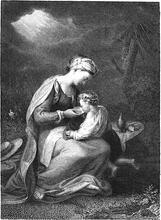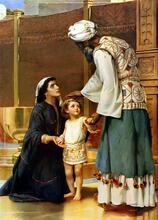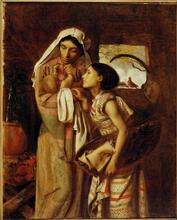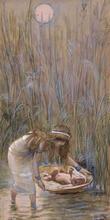Keturah: Midrash and Aggadah
Keturah was one of Abraham’s wives. The Rabbis describe her as a woman of virtue, for which she was worthy of being joined to Abraham. Though the Torah describes them separately, the rabbis often identify Keturah with Hagar, who they state came back to remarry Abraham after Sarah’s death. Her children are depicted both as the fulfillment of part of God’s promise to Abraham to be blessed by the nations and as a menace to Israel, like their brother Ishmael.
Keturah was one of Abraham’s wives. The Rabbis describe her as a woman of virtue and for that she was worthy of being joined to that righteous one [Abraham]. The Torah she-bi-khetav: Lit. "the written Torah." The Bible; the Pentateuch; Tanakh (the Pentateuch, Prophets and Hagiographia)Torah mentions this marriage in Gen. 25:1, after the death of Sarah and subsequent to the wedding of Isaac and Rebekah. The Rabbis present this as a lesson in proper conduct: if a man’s wife dies, and he has grown children, he should first see that they are married before himself taking a new wife (Gen. Rabbah 60:16). This implies that the Rabbis understood that Sarah died before Abraham remarried.
The Identification of Keturah
The Lit. (from Aramaic teni) "to hand down orally," "study," "teach." A scholar quoted in the Mishnah or of the Mishnaic era, i.e., during the first two centuries of the Common Era. In the chain of tradition, they were followed by the amora'im.Tannaim disagree regarding Keturah’s identity. According to one view, Abraham remarried after the death of Sarah and had a total of three wives: Sarah, Hagar, and Keturah. Another tradition identifies Keturah with Hagar, and thus Abraham married only twice. Each of these views finds Scriptural support for its position: the three-wife opinion relies on Gen. 25:1: “Abraham took another wife,” implying a third wife in addition to the first two. This school of thought is further bolstered by the fact that this wife also had a different name (Keturah); in addition, the plural wording of Gen. 25:6 (“to Abraham’s sons by concubines”) conveys that Abraham had at least two wives in addition to Sarah.
Those who identify Keturah with Hagar have rejoinders to each of these proofs. First, the wording “another [va-yosef]” in 25:1 teaches that these marriages were in fulfillment of a divine command; the proponents of this view learn this from Isa. 8:5: “Again [va-yosef] the Lord spoke to me,” where the word appears in the context of divine revelation. Second, the wife’s new name of Keturah does not necessarily teach that this was a different woman; rather, it was a name given to Hagar in recognition of her good qualities (see below). Third, the word pilegshim (concubines) in Gen. 25:6 is spelled deficiently, without the letter yod. The intent of the Torah was thus to only a single concubine, Hagar (Gen. Rabbah 61:4).
The view that was widely accepted by the Rabbis is the one which identifies Keturah with Hagar, and it appears in various A type of non-halakhic literary activitiy of the Rabbis for interpreting non-legal material according to special principles of interpretation (hermeneutical rules).midrashim.
Her Marriage
In the midrashic depiction, after Abraham divorces Hagar and sends her into the wilderness she sits by the well and cries to God: “See my shame!” Hagar’s demand for justice was accepted by God, who revealed Himself to Abraham after Sarah’s death and commanded him to take back his divorcée, Hagar-Keturah (Gen. Rabbah 61:4).
A different story has Isaac initiating his father’s marriage. When Isaac married Rebekah, he said to himself: I have taken a wife, while my father is without a spouse! What did he do? He went and brought him Keturah. This tradition is based on Gen. 24:62: “Isaac had just come back from the vicinity of Be’er-la-hai-ro’i”—he brought back with him Hagar, who had been at “Be’er-la-hai-ro’i,” and had also given this place its name, as is related in Gen. 16:14 (Tanhuma, Hayyei Sarah 8).
The Meaning of the Name “Keturah”
The name Keturah lends itself to a number of Rabbinic interpretations. She was perfumed (mekuteret) with commandments and good deeds (Gen. Rabbah 61:4); she was (through her good deeds) more savory (mekuteret) than all manner of spices (Pirkei de-Rabbi Eliezer [ed. Higger], chap. 29); her deeds were as fine as incense (ketoret—Tanhuma, Hayyei Sarah 8). An additional explanation gives this word the meaning of binding or sealing (keshurah). When a person secures his valuables with his seal, they are still shut when he opens his treasury. Thus, even though Abraham sent Hagar forth and she wandered in the wilderness, when he brought her back she remained chaste and no other man had known her, for which she was known as Keturah (Gen. Rabbah 61:4).
The Children of Keturah as the Realization of God’s Blessing to Abraham
Gen. 26 lists the six children that Keturah bore to Abraham: Zimran, Jokshan, Medan, Midian, Ishbak, and Shuah, to which the midrash applies the verse (Ps. 1:3): “and whatever he does prospers” (Gen. Rabbah 61:1). These offspring express the fulfillment of the blessing given by God to Abraham in Gen. 12:3: “and all the families of the earth shall bless themselves by you,” for thirty families came from Abraham: the twelve chieftains from Ishmael, the sixteen descendants of Keturah, and (Gen. 25:23) “two nations are in your womb” (Tanhuma [ed. Buber], Hayyei Sarah 8). The Rabbis further learn from Abraham that even if a man has children while he is young, he should still take another wife in his old age and beget further offspring (Gen. Rabbah 61:3). All of Keturah’s sons were the heads of nations (Gen. Rabbah 61:5).
The Offspring of Keturah as a Constant Threat to Israel
In opposition to the view that the offspring of Keturah were the realization of the Lord’s promise to Abraham, another approach presents them as perpetually menacing Israel. The Rabbis championing this position emphasize that these offspring do not follow the spiritual way of Abraham; moreover, since they already received their inheritance from him, they are not entitled to make any further demands.
The children of Keturah are depicted as waste that issued from Abraham (Sifrei on Deuteronomy 312). Zimran and Jokshan were so called because they would sing (mezamrim) and beat (mekishim) on a drum for idolatrous purposes (Gen. Rabbah 61:5). When God wished to give the Torah, He offered it to the children of Keturah and to the Ishmaelites, but they refused to accept it, since they could not abandon the robbery and theft on which their lives were based (Midrash Tannaim on Deut. 33:2).
The children of Keturah and of Ishmael did not receive Abraham’s blessing; the midrash stresses that this was an intentional decision on Abraham’s part. He said to himself: “If I bless Isaac now, I will also have to bless the children of Ishmael and of Keturah; but if I do not bless them, how will I be able to bless Isaac? Surely what He wants in His world will happen.” And so it happened that after Abraham’s death, God revealed Himself to Isaac and blessed him, as his father had intended to do (Gen. Rabbah 61:6).
Gen. 25:6 relates that Abraham sent the sons of Keturah away from Isaac “eastward, to the land of the East.” He told them: Go as far eastward as you can, so you will not be burnt by the burning coal of Isaac (Gen. Rabbah 61:7). In another tradition, Abraham sends the sons of Keturah away with a writ of divorce, as a wife is sent away from her husband. This notion is based on 25:6: “But to Abraham’s sons by concubines Abraham gave gifts while he was still living, and he sent them away from his son Isaac”; and this expulsion is both in this world and in the world to come (Pirkei de-Rabbi Eliezer, chap. 29).
The Rabbis ask: What gifts did Abraham nevertheless give the sons of Keturah? And they reply: he gave them “the name of impurity.” This apparently means that he taught them the secrets of sorcery, a characteristic occupation of the non-Jews, which distinguishes them from Israel (BT Sanhedrin 91a).
The Rabbis stress that the subjugation of the children of Keturah to Israel is eternal. When Isaac blessed Jacob, he tells him (Gen. 27:29): “Let peoples serve you, and nations bow to you”; these nations are the offspring of Ishmael and of Keturah (Gen. Rabbah 66:4). Another midrash relates that when Jacob died, the offspring of Esau, Ishmael and Keturah came to Goren ha-Atad to fight against the sons of Jacob. However, when they saw Joseph’s crown suspended above Jacob’s coffin, they took their own crowns and also suspended them above the coffin. Accordingly, this place was called Goren ha-Atad (literally, the threshing floor of thorns), since Jacob’s coffin was surrounded by those thorns (BT Suspected adulteressSotah 13a).
Keturah’s offspring never ceased to claim their father’s inheritance. The midrash tells of something involving the Rabbis during the time of Alexander the Great. The offspring of Keturah and of Ishmael came before Alexander and argued against Israel: “The Land of IsraelErez Israel belongs to us and to you, for we also are the children of Abraham!” Gebiha ben Pesisa came and said to the Rabbis: “Grant me permission, and I will go and plead against them before Alexander the Great. If they defeat me, then say: You have bested the commoner among us; and if I defeat them, tell them: The Torah of our teacher Moses has defeated you.” They authorized him, and he went and disputed with the offspring of Keturah and of Ishmael. He asked: “Whence do you bring a proof for your claim?” They replied: “From the Torah.” Gebiha ben Pesisa retorted: “I, too, will bring a proof from the Torah. It is said [in Gen. 25:5–6]: ‘Abraham willed all that he owned to Isaac; but to Abraham’s sons by concubines Abraham gave gifts.’ If a father gave his children bequests in his lifetime and sent them away from each other, has any one a claim against the other?” The offspring of Keturah and of Ishmael immediately left behind their sown fields and their planted vineyards, and fled. That year was a Sabbatical year, and Israel enjoyed the fruits of the abandoned fields (BT Sanhedrin 91a).
“The offspring of Keturah” was used as a disparaging appellation by the Rabbis when they wished to deride a Torah scholar who did not live up to expectations, just like the sons of Keturah, who, although the children of Abraham, did not attain the level of Isaac (BT Zevahim 62a–b).
The Descendants of Keturah in the Future
A late midrash relates that Abraham built for Keturah’s offspring a city surrounded by a high iron wall, and brought them inside. He raised the wall so high that sunlight would never enter; and he gave them precious stones and large pearls, which Israel would use in the days to come (Soferim, Hosafah [addition] 1, 1:1). In addition, in the days to come Abraham will be ashamed of Ishmael and the offspring of Keturah, as portrayed in Isa. 24:23: “Then the moon shall be ashamed” (Num. Rabbah 2:13).











